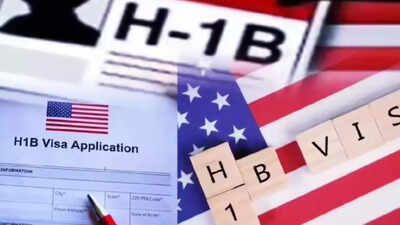Business
Indian Plaintiff Challenges Trump’s $100K Fee on H-1B Visas

A lawsuit has been filed challenging President Donald Trump‘s recent proclamation imposing a $100,000 entry fee on all new H-1B visa applications submitted after September 21. This legal action, initiated by a group of plaintiffs that includes an Indian researcher, aims to halt what they describe as an unlawful financial barrier to employment for skilled foreign workers in the United States.
The plaintiff, who has been identified only as “Phoenix Doe,” is a post-doctoral researcher at a university in the Northern District of California. She, alongside various organizations such as health care providers and educational institutions, argues that the hefty fee disproportionately impacts employers who are eligible to hire cap-exempt employees, such as universities and non-profit research organizations.
As reported by The Times of India, the lawsuit highlights the immediate consequences of the entry fee, which will begin affecting new H-1B cap applications in the Spring 2026 lottery season. In the interim, the university employing the plaintiff has paused her H-1B sponsorship, placing her in a precarious situation.
The researcher’s work is focused on understanding the genetic and epigenetic causes of vision loss due to aging, diabetes, and rare inherited disorders. Her contributions are deemed essential for advancing research in this field, as her project requires a commitment of at least two additional years. With the university’s decision to pause her visa application, she faces uncertainty regarding her future in the U.S.
In the lawsuit, she claims that the anxiety stemming from this situation has exacerbated her post-traumatic stress disorder. Without judicial relief, she may be forced to leave her position within four months, which would not only disrupt her career but also negatively impact vital eye-disease research and associated funding prospects.
The legal filing asserts that the imposition of a $100,000 fee effectively bars many U.S. employers from sponsoring foreign professionals. The lawsuit seeks an injunction to stop the fee’s enforcement, along with a declaration that the order is unlawful and a return to the original H-1B framework without the fee’s imposition.
This case has garnered significant attention, particularly within the Indian diaspora, as India is home to the largest share of H-1B visa holders. Advocates emphasize that South Asians comprise a substantial portion of H-1B workers in the U.S., contributing significantly to various sectors. The lawsuit underscores the broader implications of shifting immigration policies, which they argue jeopardize the financial and social stability of the communities these workers support.
In their statement, the plaintiffs assert, “This unlawful fee threatens workers, their families, and the financial and social wellbeing of the communities in which they live.” The outcome of this lawsuit could have far-reaching consequences for skilled professionals navigating the U.S. immigration system, potentially setting a precedent for future applications and policies.
-

 World5 months ago
World5 months agoSBI Announces QIP Floor Price at ₹811.05 Per Share
-

 Lifestyle5 months ago
Lifestyle5 months agoCept Unveils ₹3.1 Crore Urban Mobility Plan for Sustainable Growth
-

 Science4 months ago
Science4 months agoNew Blood Group Discovered in South Indian Woman at Rotary Centre
-

 World5 months ago
World5 months agoTorrential Rains Cause Flash Flooding in New York and New Jersey
-

 Top Stories5 months ago
Top Stories5 months agoKonkani Cultural Organisation to Host Pearl Jubilee in Abu Dhabi
-

 Sports4 months ago
Sports4 months agoBroad Advocates for Bowling Change Ahead of Final Test Against India
-

 Science5 months ago
Science5 months agoNothing Headphone 1 Review: A Bold Contender in Audio Design
-

 Top Stories5 months ago
Top Stories5 months agoAir India Crash Investigation Highlights Boeing Fuel Switch Concerns
-

 Business5 months ago
Business5 months agoIndian Stock Market Rebounds: Sensex and Nifty Rise After Four-Day Decline
-

 Sports4 months ago
Sports4 months agoCristian Totti Retires at 19: Pressure of Fame Takes Toll
-

 Politics5 months ago
Politics5 months agoAbandoned Doberman Finds New Home After Journey to Prague
-

 Top Stories5 months ago
Top Stories5 months agoPatna Bank Manager Abhishek Varun Found Dead in Well









